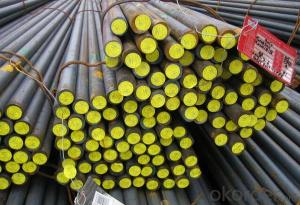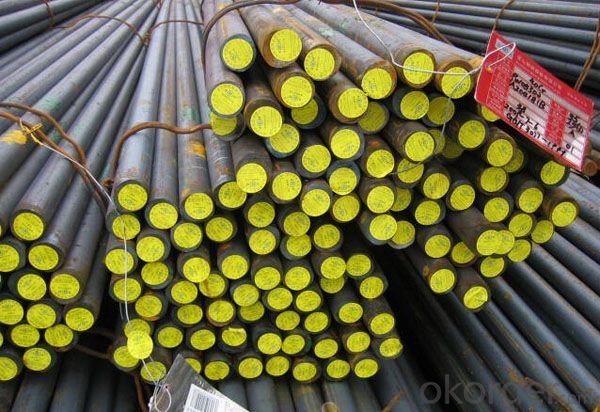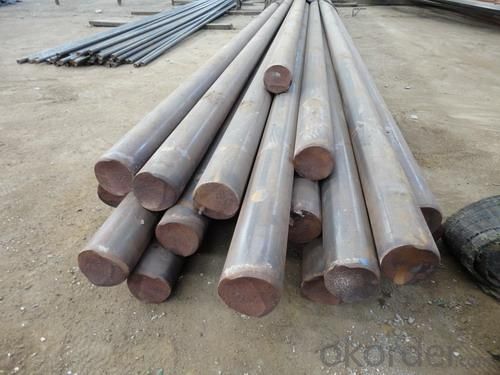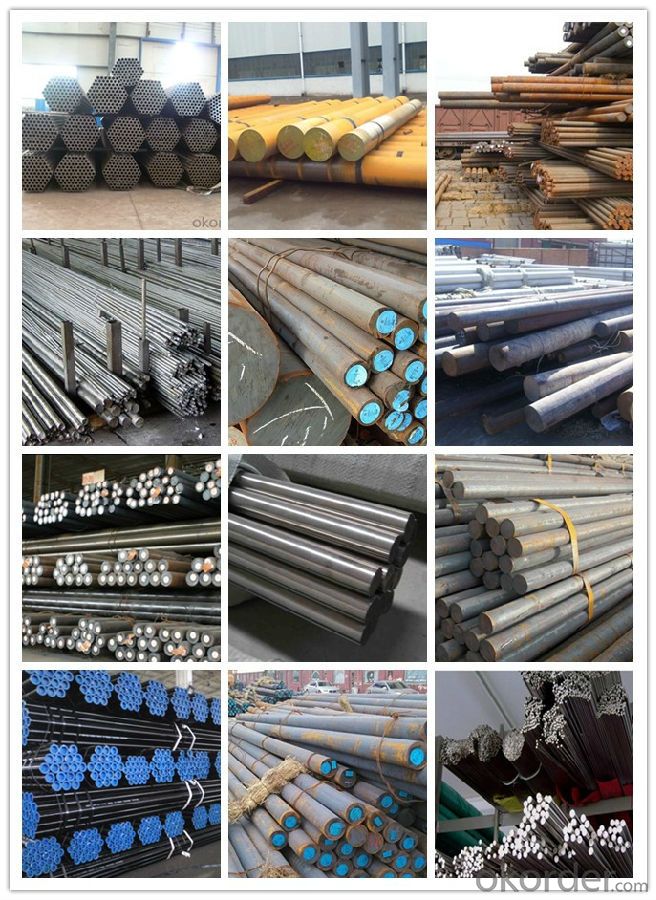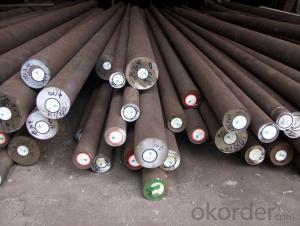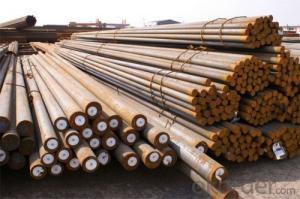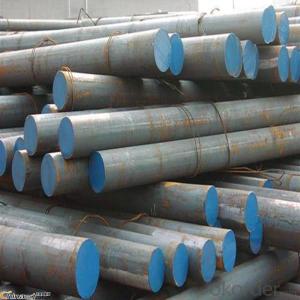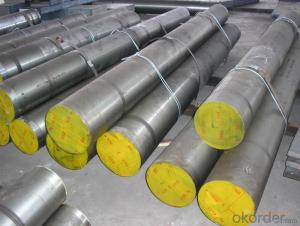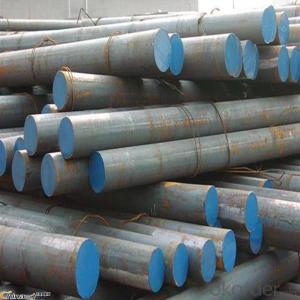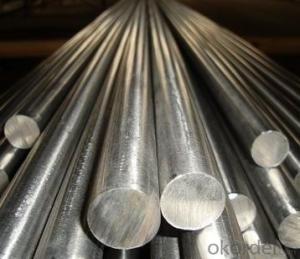Special Steel SAE4140 Alloy Steel Round Bar
- Loading Port:
- China main port
- Payment Terms:
- TT OR LC
- Min Order Qty:
- 30 m.t.
- Supply Capability:
- 10000 m.t./month
OKorder Service Pledge
OKorder Financial Service
You Might Also Like
Specification
Product information
1. Grade: 4140,SAE4140, 42CrMo4, 1.7225,SCM440
2. Specification: Dia: 16~800mm Length:2000-13000mm or as required
3. Process: EAF+LF+VD
4. Technique:Forged
5.Treatment:hot rolled,cold drawn
6.Mechanical performance:
Strength of extension | 1080MPA |
Yield point | 930MPA |
Elongation | 12% |
Contractibility rate | 45% |
Impacting energy | 63J |
7.Chemical composition(for reference only):
Grade | C | Si | Mn | P≤ | S≤ | Cr | Mo |
SAE4140 | 0.38/0.43 | 0.15/0.35 | 0.75/1.00 | 0.035 | 0.035 | 0.80/1.10 | 0.15/0.25 |
8. Compared grades of 4140 steel
GB-China | AISI-America | DIN-GERMANY | JIS-Japan |
42CrMo | 4140 | 1.7225 42CrMo4 | SCM440 |
Product show
Workshop show
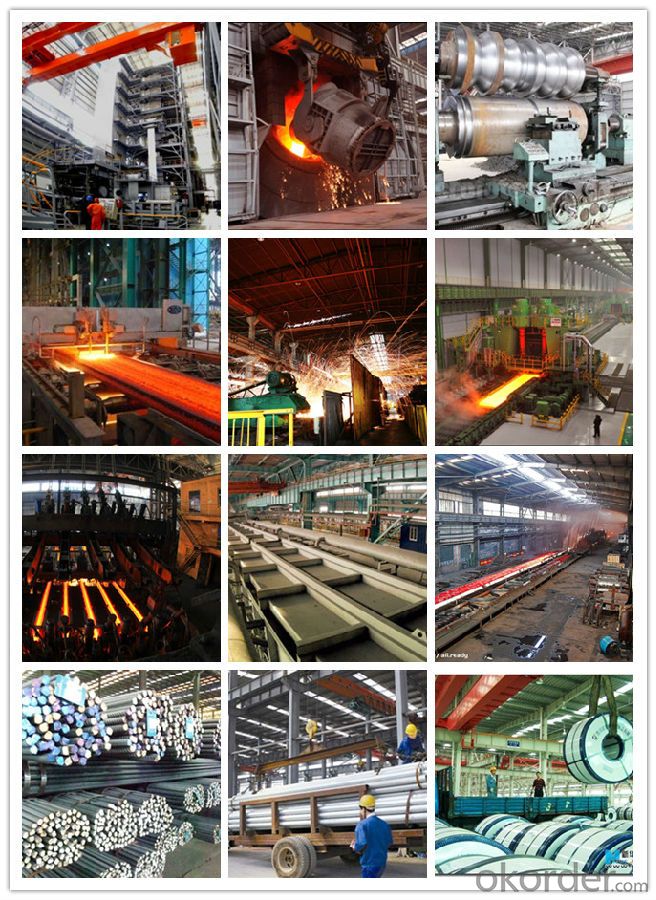
Shipping
1. FedEx/DHL/UPS/TNT for samples, Door-to-Door;
2. By Air or by Sea for batch goods, for FCL; Airport/ Port receiving;
3. Customers specifying freight forwarders or negotiable shipping methods!
Delivery Time: 3-7 days for samples; 5-25 days for batch goods.
Payment Terms
1.Payment: T/T, L/C, Western Union, MoneyGram,PayPal; 30% deposits; 70% balance before delivery.
2.MOQ: 1pcs
3.Warranty : 3 years
4.Package Informations: 1) EXPORT, In 20 feet (GW 25 ton) or 40 feet Container (GW 25 ton)
2)as customer's requirement
Why choose us?
(1) The leading exporter in China special steel industry.
(2) Large stocks for various sizes, fast delivery date.
(3) Good business relationship with China famous factories.
(4) More than 7 years steel exporting experience.
(5) Good after-sales service guarantee.
- Q: What are the different passivation techniques used for special steel?
- There are several passivation techniques used for special steel, including chemical passivation, electrochemical passivation, and mechanical passivation. Chemical passivation involves treating the steel surface with acids or other chemical solutions to remove impurities and create a passive film that protects against corrosion. Electrochemical passivation utilizes an electrical current to enhance the formation of the protective oxide layer. Mechanical passivation involves processes like abrasive blasting or grinding to remove contaminants and improve the surface finish. These techniques are commonly employed to enhance the corrosion resistance and durability of special steel.
- Q: How does special steel perform in stamping applications?
- The unique properties of special steel make it an excellent choice for stamping applications. Its high strength and durability ensure that it can withstand wear and tear during the stamping process, resulting in longer tool life and reduced maintenance costs. Additionally, special steel's heat resistance allows it to maintain its structural integrity even at high temperatures, preventing warping or deformation. Its exceptional dimensional stability ensures precise and consistent results, while its excellent formability allows for the creation of intricate designs. Overall, special steel's properties make it a reliable and versatile option for a wide range of stamping applications.
- Q: Can special steel be used in the appliance manufacturing industry?
- Yes, special steel can be used in the appliance manufacturing industry. Special steels, such as stainless steel or high-strength steel, offer various advantages such as corrosion resistance, durability, and enhanced mechanical properties. These qualities make them suitable for manufacturing appliances that require high performance, such as refrigerators, ovens, or washing machines. Additionally, special steels can be customized to meet specific design requirements and can contribute to the overall aesthetic appeal of the appliances.
- Q: How is corrosion-resistant tool steel used in the production of molds and dies?
- Corrosion-resistant tool steel is commonly used in the production of molds and dies due to its ability to withstand exposure to corrosive environments. This steel helps to prevent rust and degradation, ensuring that the molds and dies maintain their structural integrity and dimensional accuracy over time. By using corrosion-resistant tool steel, manufacturers can produce high-quality molds and dies that are durable and resistant to wear and tear, ultimately improving the overall efficiency and longevity of the production process.
- Q: Can special steel be used in the electronics manufacturing industry?
- Yes, special steel can be used in the electronics manufacturing industry. Special steel alloys, such as stainless steel or high-strength low-alloy (HSLA) steel, offer excellent properties like corrosion resistance, electrical conductivity, and magnetic shielding, making them suitable for various electronic components like connectors, sensors, circuit boards, and casings. These specialized steel materials ensure durability, protection, and reliable performance in demanding electronic applications.
- Q: What are the properties of magnesium alloys?
- Magnesium alloys exhibit a combination of desirable properties, including low density, high strength-to-weight ratio, good corrosion resistance, excellent machinability, and high thermal conductivity. They also possess good damping capacity, making them suitable for applications requiring vibration reduction. Additionally, magnesium alloys can be easily cast, forged, and welded, allowing for a wide range of manufacturing processes. However, they are prone to ignite under certain conditions and can be more expensive compared to other metals.
- Q: What are the different molding grades of special steel?
- Various industries and applications utilize several distinct molding grades of special steel. Some well-known molding grades are: 1. P20: This grade finds wide usage in the production of plastic injection molds, die casting, and extrusion dies. It boasts excellent machinability, high hardness, and good polishability, making it suitable for high-precision molding operations. 2. H13: Primarily used for die casting and forging applications, this grade is a hot work tool steel. It offers high toughness, good heat resistance, and excellent wear resistance, making it suitable for molding processes in high-temperature environments. 3. S7: Commonly employed in molding applications requiring high impact resistance, this grade is a shock-resistant tool steel. It provides good hardness, toughness, and machinability, making it ideal for applications like shear blades and hammer dies. 4. NAK80: Often utilized for high-quality mirror surface molds and precision molding, this grade is a pre-hardened mold steel. It offers high polishability, excellent dimensional stability, and good wear resistance, making it suitable for producing parts with demanding surface finish requirements. 5. 420SS: This grade, a stainless steel, is commonly used in molding applications that require corrosion resistance. It provides good hardness, moderate strength, and excellent corrosion resistance, making it suitable for applications such as medical devices and food processing equipment. These examples represent just a fraction of the available molding grades of special steel on the market. Each grade possesses distinct properties and characteristics that render them suitable for various molding applications. It is crucial to select the appropriate grade based on the specific requirements of the molding process to ensure optimal performance and durability.
- Q: What are the properties of weathering steel?
- Weathering steel, also known as corten steel, possesses several distinctive properties. It exhibits high resistance to corrosion, making it suitable for outdoor structures without the need for protective coatings. Its unique composition allows for the formation of a stable rust-like appearance, providing an aesthetically pleasing and natural finish. Moreover, weathering steel has excellent strength and durability, making it ideal for various applications, including bridges, buildings, and architectural elements.
- Q: What are the common heat treatment methods used for special steel?
- Special steel can undergo various heat treatment methods to enhance its mechanical properties and performance. Some commonly used techniques include: 1. Annealing: By heating the steel to a specific temperature and gradually cooling it, internal stresses are relieved and a refined microstructure is formed. This process improves the steel's machinability and ductility. 2. Normalizing: The steel is heated above its critical point and then cooled in still air. This method refines the grain structure, enhances toughness, and improves strength. 3. Quenching: Rapid cooling is achieved by immersing the steel in a quenching medium like water, oil, or polymer. It increases hardness and strength by forming a hard martensitic structure. However, quenching may introduce internal stresses and decrease toughness, so tempering is often performed afterwards. 4. Tempering: Quenched steel is reheated to a specific temperature and gradually cooled. This relieves internal stresses, reduces hardness, and improves toughness and ductility. Tempering also enhances resistance to brittle fracture. 5. Austempering: Steel is quenched to a temperature slightly above its martensitic transformation range, followed by holding it at this temperature until austenite transforms into bainite. This unique microstructure offers a combination of high strength and good toughness. 6. Martempering: Similar to austempering, but the steel is quenched just below its martensitic transformation range and held at that temperature until transformation is complete. Martempering produces a microstructure with improved strength and toughness compared to conventional quenching. These heat treatment methods are widely used to tailor special steel properties according to specific applications and requirements. The choice of method depends on factors such as desired mechanical properties, steel composition, and the intended use of the final product.
- Q: How does special steel contribute to reducing energy consumption?
- Special steel contributes to reducing energy consumption in several ways. Firstly, special steel is known for its high strength and durability, allowing it to be used in the construction of lightweight structures. This helps in reducing the overall weight of vehicles, machinery, and buildings, resulting in lower energy requirements for their operation and transportation. Additionally, special steel is used in the manufacturing of energy-efficient appliances and equipment, such as turbines and generators, which optimize energy conversion and minimize energy losses. Furthermore, special steel is often used in the production of renewable energy systems like wind turbines and solar panels, enabling the efficient generation of clean energy. Overall, the unique properties of special steel help in achieving energy efficiency goals and promoting sustainable practices.
Send your message to us
Special Steel SAE4140 Alloy Steel Round Bar
- Loading Port:
- China main port
- Payment Terms:
- TT OR LC
- Min Order Qty:
- 30 m.t.
- Supply Capability:
- 10000 m.t./month
OKorder Service Pledge
OKorder Financial Service
Similar products
Hot products
Hot Searches
Related keywords
